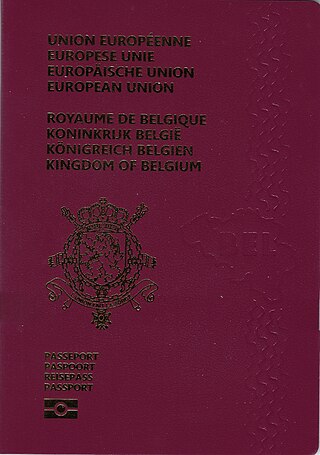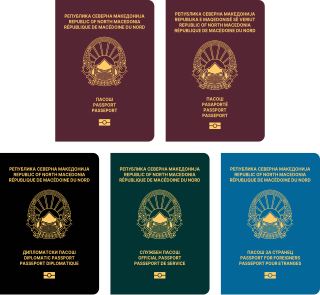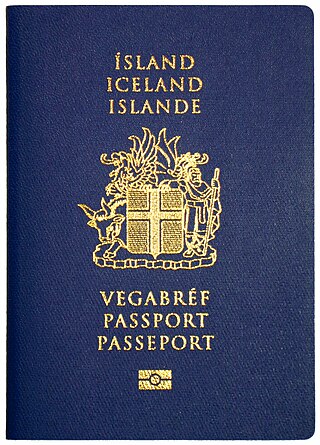
Serbian passport is the primary document of international travel issued to nationals of Serbia. Passports are issued and renewed by the Serbian Police on behalf of the Ministry of Internal Affairs or, if the citizen resides abroad, by the Serbian diplomatic missions. Besides serving as proof of identity and of citizenship, it facilitates the process of securing assistance from Serbian consular officials abroad, if needed.

Croatian passport is issued to citizens of the Republic of Croatia for the purpose of international travel. The passport has the purpose of serving as proof of Croatian citizenship and identity. Responsibility for their issuance lies with the Ministry of the Interior; and for citizens abroad, passports are issued by the local embassy or consulate. Croatian passports are valid for ten or five years, and are not renewable. Every Croatian citizen is also a citizen of the European Union. The passport, along with the national identity card allows for free rights of movement and residence in any of the states of the European Economic Area and Switzerland.

Thai passport is the passport issued to citizens and nationals of Thailand by the Passport Division of the Department of Consular Affairs within the Ministry of Foreign Affairs. Thai biometric passports have been issued since August 2005.

Finnish passport are issued to nationals of Finland for the purpose of international travel. Aside from serving as proof of Finnish nationality, they facilitate the process of securing assistance from Finnish consular officials abroad.

A Belgian passport is a travel document issued by Belgium to Belgian citizens to facilitate international travel. It grants the bearer international passage in accordance with visa requirements and serves as proof of citizenship.

A Dutch passport is an identity document issued to citizens of the Kingdom of the Netherlands for the purpose of international travel. As the Netherlands only distinguish one category of citizen, for all countries in the Kingdom, passports are the same for all four countries. The passport also serves as a means of identification as required by the Dutch law since 1 January 2005 for all persons over the age of fourteen. Dutch passports are valid for a period of ten years from issuing date. The passport complies with the rules for European Union passports. Since 26 August 2006 all passports are issued as a biometric passport with an embedded contactless smartcard RFID chip for storing biometric data. Every Dutch citizen is also a citizen of the European Union. The nationality allows for free rights of movement and residence in any of the states of the European Union, European Economic Area, and Switzerland.

Bruneian passports are issued to citizens of Brunei for the purpose of international travel.

Latvian passports are issued to citizens of Latvia for identity and international travel purposes. Receiving a valid passport is mandatory from the age of 15, but passports can be requested for younger children if needed for travel and other purposes. A passport is valid for 10 years if the citizen is 20 or older, for 5 years if 5–20 and for 2 years if 0–5 years old. Non-citizen passports, and refugee travel documents, are also issued. Every Latvian citizen is also a citizen of the European Union. The passport, along with the national identity card, allows Latvian citizens to travel and to have rights of free movement and rights to reside in any states of the European Union, European Economic Area and Switzerland.

A Moldovan passport is an international document issued to citizens of the Republic of Moldova for the purpose of international travel. The passport is issued by the Public Services Agency and by Moldovan foreign representations abroad. The passport is valid for ten years. For children under the age of seven years it is valid for four years. Since 1 January 2006, Moldovan citizens can hold two passports simultaneously, providing a written request has been submitted to local passport office.

The North Macedonian passport is issued to citizens of North Macedonia for the purpose of international travel. Responsibility for their issuance lies with the Ministry of the Interior. The validity of the passport is 5 years for persons 4 to 27 years of age and 10 years for those 27 years of age and older. For children ages four and under, the validity of the passport is limited to two years. The passports conform to the recommended standards of the International Civil Aviation Organization (ICAO), and are biometric passports.

The Jamaican passport is issued to citizens of Jamaica for international travel. The passport is a CARICOM passport as Jamaica is a member of the Caribbean Community.

The Syrian passport is a travel document issued by Syria's Directorate of Immigration and Passports to Syrian citizens for international travel. It can also be issued on behalf of the directorate at various Syrian diplomatic missions outside of Syria.

A Barbados passport is a travel document issued to citizens of Barbados, in accordance with Citizenship Act from 1978, the Immigration Act from 1997, and the Barbados Constitution, for the purpose of facilitating international travel. It allows the bearer to travel to foreign countries in accordance with visa requirements, and facilitates the process of securing assistance from Barbados consular officials abroad, if necessary.

The Kuwaiti passport is a passport document issued to citizens of Kuwait for international travel.

The Burundian passport is issued to citizens of Burundi for international travel.

The Grenadian passport is a travel document issued to citizens of Grenada, in accordance with the Grenadian Citizenship Act of 1976 and the Grenada Constitution, for the purpose of facilitating international travel. It allows the bearer to travel to foreign countries and the Commonwealth of Nations, in accordance with visa requirements, and facilitates the process of securing assistance from Grenadian consular officials abroad, if necessary.

The Cambodian passport is issued to citizens of Cambodia for international travel.

Visitors to Antigua and Barbuda must obtain an Electronic Entry Visa (EEV), unless they come from one of the visa exempt countries.

Laotian passports are issued to citizens of Laos by Consular Department within the Ministry of Foreign Affairs to travel internationally. The biometric passport has been issued since 30 June 2016.

Passports of the EFTA member states are passports issued by the European Free Trade Association (EFTA) member states Iceland, Liechtenstein, Norway and Switzerland. EFTA is in this article used as a common name for these countries.




















